#philosophical principles
Photo

#history of the devil and the idea#demonic#the fallen angel#books#cover books#cover art#philosophical principles#practice of evil through#dark forces#contemporary manifestations of evil#book#cover#cover book#literature#goth aesthetic#gothic aesthetic
3K notes
·
View notes
Text
"Alchemy Unveiled: Navigating the Mysteries with Dr. A. S. Raleigh's Philosophia Hermetica"

Dr. A. S. Raleigh's "Philosophia Hermetica" serves as a captivating portal into the enigmatic world of alchemy, offering a profound exploration in the form of ten enlightening lessons. This course masterfully introduces readers to the intricate philosophy behind alchemy, unraveling its secrets and guiding them through the labyrinth of hermetic wisdom. Dr. Raleigh's narrative is both scholarly and accessible, making complex concepts comprehensible to novices while still offering depth for seasoned seekers.
The lessons delve into the historical roots of alchemy, connecting its rich tapestry to broader philosophical frameworks. Raleigh skillfully navigates through the symbolic language of alchemy, demystifying its arcane symbols and cryptic manuscripts. The course not only serves as an intellectual endeavor but also as a spiritual quest, inviting readers to contemplate the profound interplay between the material and metaphysical realms.
The author's meticulous approach, coupled with a flair for engaging prose, makes "Philosophia Hermetica" a valuable resource for anyone intrigued by the mystical arts. Whether you're a seasoned alchemist or a curious mind, this course promises a transformative journey, providing a nuanced understanding of alchemy's role in shaping the philosophical landscape. In a world where ancient wisdom meets modern intellect, Dr. A. S. Raleigh's work stands as a beacon, illuminating the alchemical path with scholarly brilliance and spiritual insight. Embark on this transformative odyssey and unlock the secrets of "The Philosophy of Alchemy."
Dr. A. S. Raleigh's "Philosophia Hermetica" is available in Amazon in paperback 11.99$ and hardcover 18.99$ editions.
Number of pages: 167
Language: English
Rating: 8/10
Link of the book!
Review By: King's Cat
#Hermetic Philosophy#Alchemical Wisdom#Spiritual Alchemy#Esoteric Knowledge#Transmutation#Philosophical Principles#Mystical Teachings#Occult Studies#Spiritual Enlightenment#Ancient Wisdom#Symbolism#Inner Transformation#Esoteric Traditions#Alchemical Symbolism#Spiritual Insights#Mysticism#Metaphysical Exploration#Hermetic Principles#Alchemy Lessons#Hidden Knowledge
0 notes
Text
"Alchemy Unveiled: Navigating the Mysteries with Dr. A. S. Raleigh's Philosophia Hermetica"
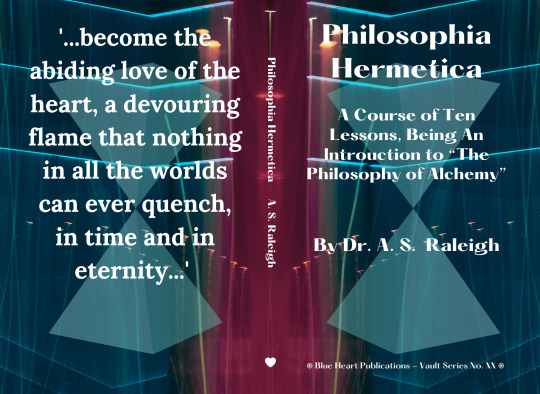
Dr. A. S. Raleigh's "Philosophia Hermetica" serves as a captivating portal into the enigmatic world of alchemy, offering a profound exploration in the form of ten enlightening lessons. This course masterfully introduces readers to the intricate philosophy behind alchemy, unraveling its secrets and guiding them through the labyrinth of hermetic wisdom. Dr. Raleigh's narrative is both scholarly and accessible, making complex concepts comprehensible to novices while still offering depth for seasoned seekers.
The lessons delve into the historical roots of alchemy, connecting its rich tapestry to broader philosophical frameworks. Raleigh skillfully navigates through the symbolic language of alchemy, demystifying its arcane symbols and cryptic manuscripts. The course not only serves as an intellectual endeavor but also as a spiritual quest, inviting readers to contemplate the profound interplay between the material and metaphysical realms.
The author's meticulous approach, coupled with a flair for engaging prose, makes "Philosophia Hermetica" a valuable resource for anyone intrigued by the mystical arts. Whether you're a seasoned alchemist or a curious mind, this course promises a transformative journey, providing a nuanced understanding of alchemy's role in shaping the philosophical landscape. In a world where ancient wisdom meets modern intellect, Dr. A. S. Raleigh's work stands as a beacon, illuminating the alchemical path with scholarly brilliance and spiritual insight. Embark on this transformative odyssey and unlock the secrets of "The Philosophy of Alchemy."
Dr. A. S. Raleigh's "Philosophia Hermetica" is available in Amazon in paperback 11.99$ and hardcover 18.99$ editions.
Number of pages: 167
Language: English
Rating: 8/10
Link of the book!
Review By: King's Cat
#Hermetic Philosophy#Alchemical Wisdom#Spiritual Alchemy#Esoteric Knowledge#Transmutation#Philosophical Principles#Mystical Teachings#Occult Studies#Spiritual Enlightenment#Ancient Wisdom#Symbolism#Inner Transformation#Esoteric Traditions#Alchemical Symbolism#Spiritual Insights#Mysticism#Metaphysical Exploration#Hermetic Principles#Alchemy Lessons#Hidden Knowledge
0 notes
Text
If you want to see Hobbit comic chapters early, and more concept art/deleted things/drawing tips/behind the scenes art—-soon I will launch a Patreon!
I prefer to *publicly* post my comics in massive full-chapter chunks every few months. But If you want to see pages “as I draw them,” usually around one page on a weekly basis, you will be able to subscribe to me there soon. :)
This will come with the understanding that the patreon pages are still “previews” and they may be heavily edited later on as I finish the chapter. (Sometimes I’ll see something that bugs me on page 1 after I finish page 15 and have to fix it!)
I will also post things related to my other upcoming art/comic projects, all of which have a similar aesthetic of “changing art styles to convey different narrators.”
If I ever take a hiatus from drawing or from updating the patreon, I will pause all billing for the month so that no one is charged.
My goal with this Patreon is to be extremely professional and accountable! I’m confident I’ll be able to run this very well!
Most of the things I post on the Patreon will also be posted publicly, eventually. But because I obsessively polish things (even the captions under posts of old art) they won’t be posted publicly for a longer amount of time. I don’t want people to feel left out if they can’t afford to pay a few dollars a month; this is just “early access” to slightly less polished stuff for the people who can.
On a personal level I would like for the Patreon to be able to cover the cost of Photoshop and a couple other art tools I use in my work, so that I’m no longer “paying” to draw this comic! :3
I haven’t yet launched the Patreon because I am busy filling it with a lot of concept art work/bonus art, to make sure it is worth subscribing to.
But yeee get excited! I hope some people are interested!
And I hope to have it ready by February 13th. :)
#the hobbit#retelling the hobbit#the hobbit comic#:3#patreon announcement#just makin people aware of it!#so people aren’t blindsided when I bring it up#but yeah#I’m working on the next chapter and realizing it will take a While#like a While#but yee!#but I am still philosophically opposed to posting one page at a time on a public blog#on principle
56 notes
·
View notes
Quote
Nothing is more usual than for philosophers to encroach upon the province of grammarians; and to engage in disputes of words, while they imagine that they are handling controversies of the deepest importance and concern.
David Hume, An Enquiry Concerning the Principles of Morals
#philosophy#quotes#David Hume#An Enquiry Concerning the Principles of Morals#philosophers#grammar#norms#conventions#language#words#meaning
112 notes
·
View notes
Text
i think the main issue in arguing with zionists is that, well, they believe in zionism! if israel did deserve to exist, then the genocide and injustice in palestine could be argued for (not like it should be, but it certainly could) -- and zionists believe israel deserves to exist.
i, unfortunately, have a large amount of experience interacting (personally) with zionism and zionists. most of those i've talked to feel for the palestinians, and the violence they are facing, but they fail to realize (or they staunchly deny) the very, very active part israel and the IDF have had in that -- and how it's representative of what the nation has always done.
at the same time, they focus more on israeli hostages than palestinian ones -- and i know, of course, that these zionist jews i've interacted with are either israeli or have loved ones in israel, and so have a very personal stake in the safety of israeli hostages (which may very well be friends or family members), but i find it strange how much emphasis they put on hamas' cruelty in taking hostages while the IDF is doing the same thing (in essence; the exact details of who's doing it worse are important to note, but not relevant right now, because folks should realize that their side is being at least as cruel as the enemy's).
recently i was drawn into an argument with an israeli zionist (who, unfortunately, is very close to the action and tragedy by being israeli), and she was incredibly offended by my anti-zionism and my opposition to israel's abject cruelty to palestinian citizens, as it seemed (to her) like i was bypassing the cruelty hamas has enacted on israeli citizens -- which is very telling. i've noticed that we as jews have the tendency, whatever the situation may be, of focusing more on our pain than the pain of others, even if we are the ones hurting them. that person has every reason to be scared and hurt, and i'd be lying if i said her response wasn't at least somewhat sympathetic, but her pain in this horrible, violent conflict does not invalidate the pain on the other side. jews, throughout this recent crisis, have consistently not talked in depth about the constant losses in palestine -- am i suddenly being callous by focusing on those losses, and not our own? (YOUR PAIN AND THEIRS AREN'T MUTUALLY EXCLUSIVE, YOU DOLT! sorry...)
because it all comes down to believing in israel! my mom has always told me about how beautiful it is there, about her time living on a kibbutz... and sure, it might be nice. i can't argue with that. but why is it that our nationalism for israel is so strong, so virulent? i have not seen patriots as loyal for any other country. and when you criticize israel, israelis feel like you're criticizing their entire existence -- and many non-israeli jews do, as well. because zionism has been built so deep into the modern religion! it's made to be a necessary piece! belief in it is the default!
and, from the inside looking in, i can't be surprised that many jews take anti-zionism as being antisemitic -- because, to them, israel and zionism stand as the pinnacle of safety and support for the jewish people. it is impossible to argue with them about anything above that base layer, as the base layer itself serves as a foundation: so long as a jew thinks that israel is right, deserved, and necessary, no proof will sway them into hating israel. it's just impossible, and that's very frustrating.
for me in particular, i find it very frustrating, as this single idea has turned so many people i know to support a genocidal entity. they believe in and support israel, so they stand with it now -- even if they condemn its current actions, they neglect how those actions are just an extension of its inherent existence -- whether they think israel's doing the right thing or wrong thing right now, they don't really care at the end of the day, because israel, to them, is necessary in keeping the jewish people alive. they stand with it, thinking that jews can only stand at all if they do.
but a genocidal crutch is no crutch at all: it only breaks us more. zionist jews make me so mad, and the worst part is that i could never express that to them in a way they'll understand.
#melonposting#anti-zionism#israel#i am so madddd and frustrated and stressed#with the whole camp thing going on my parents will inevitably find out (and soon!) that i'm anti-zionist#and given their age and proximity -- they're so deeply entrenched in zionism that i can't even hope to sway them#it's so sad and scary (i don't want them to be mad at me -- even though that really isn't the important thing here)#but it's also philosophically bizarre... like these people have good principles!#it's just this one tiny stupid thing (believing in israel) that's effectively turned them into bad people!#<- it's weird saying something like that. because i don't think they're bad people. but they're zionist.#part of it is that they're my parents and i love them but also... they're so good otherwise. a single thing went wrong.#(okay well not a single thing but it's generally minute things y'know?)#i don't wanna hate my parents. and i don't want them to hate me. can they please for the love of god stop#(takes every jew i know by the shoulders and shakes them back and forth) PLEAAAASE FOR THE LOVE OF GOD STOPPPPPPP#anyway it's very hard for me to do work because i have this on my mind.#how do i break it to my parents that 1. i won't be working at camp this summer and 2. it's because i hate zionism?#i'm not cut out for situations like these ughhhhh why did i have to post that stupid anti-zionist instagram story in march#i could've just chosen not to take the job on my own accord and have enough time to come up with an excuse for my parents#whatever. too late for that. i dug my grave and now must lie in it#i guess it's character-building?? :')
19 notes
·
View notes
Text

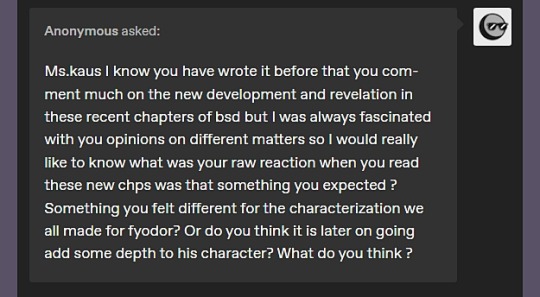
Greetings, Anon! Thank you for your questions. I have to admit, even in the past, I refrained from posting reactions or speculations as BSD chapters release, but you already knew that, so I will indulge you. I'll answer each part of your ask. BSD ch113 thoughts below, manga spoilers ahead.
♠ "What was your raw reaction?"
It was not a calm, quiet one, I can tell you that. No, in fact I screamed with excitement as if I was in a Roman amphitheatre and my favourite gladiator just got back up on his feet, out of sheer force of will, grinning and sweaty. My scream was the fastest way I could "verbalize" the fact that I was overjoyed to see him alive again, even if it's in the 15th century, and on top of that he seemed to be some kind of spy monk all chained up and having what seems to be a ridiculous amount of fun getting caught and discussing with Bram. This is all very in-character for him.
♠ "Was that something you expected?"
Absolutely not. Yes, yes, I truly did not expect a jump back in time and this infobomb drop, despite the fact that we did get a few hints that Fedya seemed present at past events when all the other character really appeared younger than him (near the end of S4ep3, where on a rooftop Fedya says "It's not V, it's Five" and I am seriously like bruh I give up what I want to say is I need more data to work with, what am I supposed to do with this, rationally speaking?). However, we can't yet extract anything conclusive from this. Is he ageless? A time-traveler? Immortal? Does he revive? When was he born? Was he born at all or created differently somehow? Is he of BSD's world, or an external one (Beast liveaction finale anyone?)? Is this all within the Book and he's just… idk flipping the pages? Anything is possible and I refuse to spend a lot of time working with incomplete data. This is not very follower-friendly (as in, my blog is basically inactive in-between), I know and I apologize, but if after many chapters there will be something worthwile to add to my essay (with what Fukuchi said in ch113 I already have important stuff to add), under those circumstances I will consider writing an update. It's not yet time.
♠ "<Was that> something you felt different for the characterization we all made for Fyodor?"
Hmm, I would hesitate to refer to a characterization "we all made" for him (I wish! T o T), because my analysis and blog are but a tiny tiny part of the fandom (I think…? I wonder about my Fedya essay's reach or influence sometimes). But let's say here we refer to one that comes close to what I tried to show in my essay. In that case, I would say that there is nothing to fear here in this chapter, but it's very understandable to have massive trust issues at this point. We went through a miserable, miserable time when the previous ones made the guy who visually memorized a full deck of used cards somehow not notice Chuuya wearing contacts and fake vampire teeth, despite knowing the vampire race since… well, the 15th century! I cannot even begin to describe what I felt reading ch111.5-112, I was beyond repulsed. Lovers of "villain" characters understand the following thing well: in most media, our fav has to lose, he has to die or disappear at some point, with rare exceptions. I, too, know this well, but that was no compelling way to solve BSD's villain threat. I still don't know how BSD will wash away that narrative stain, as I consider it, but then again one of the reasons we love this manga is that it keeps us on the edge of our seats and the most absurd yet fun turns can happen out of the blue. We can reasonably ask ourselves: ok, what is the purpose of showing Fedya's backstory now? If it's for build-up, we can already start grinning like Cheshire cats. What could possibly be next? I'm cautiously optimistic, things look in-character and good to me. Very good, in fact.
♠ "Or do you think it is later on going add some depth to his character?"
Backstories are shown usually for a very clear purpose. We don't know the purpose yet, but if it's done well, then… then my whole essay could be at risk lmao (and I love this sensation). New info could add so much depth to his character, in fact, that his previously observed traits could gain new meanings, or even contradictory ones. Whichever it will be, I think it's pretty safe to bet on "his backstory will be very relevant".
♠ Bonus: even if I enjoy going "full analytical" and enter conference speech mode when asked, I am driven by strong emotions, by which I want to say – I am not immune to assassin/spy monk Fedya chained up like that and having the time of his life again. I missed seeing him entertained like that, and his current …………. visual representation in the.. uh. ..chapter, yeah, well, it's doing things to my Depeche Mode-worshipping heart.
Anyway, to conclude with some facts we know as of now:
a. Fedya and Bram are inside the Bran Castle, close to the Romanian city of Brașov, "deep in the Carpathians" although not built at high altitude itself. It's basically a fortress built between 1377-1388, with several later additions. The BSD representation of it is very accurate to how it looks today. It's near perfect, actually, I applaud.
b. Bram mentions King Matthias, and in this context that can only mean Matthias Corvinus, King of Hungary for 1458-1490. The meeting between Fedya and Bram thus happens some year during his reign, when Transylvania was still part of the Kingdom of Hungary. What is still strange to me is that I can't pinpoint Bram's exact position, as in… were his people independent? Or avoided? I feel like I need to re-read past Bram-related chapters to think about this.
c. Nevermind Bram, the things that Fukuchi says, those are the real goldmine here, but the gold is still… encrypted? I mean: Fedya made the DoA plan (more than confirmed now), and because Fukuchi asked for the condition to keep casualties under 500, Fedya respected that and we got entertained for like half of the whole BSD manga: using coin bombs for terror, for economic/political destabilization, using the vampire infection to avoid further violence, these things. The more you think about it, the more insane it gets. Since Fedya agreed to this condition, it means causing (more) deaths and violence were expendable things to him. (But imagine this: Fukuchi said "I want max. 500 deaths" and Fedya said "Yeah I can do that", now if Fukuchi would've said "I want max. 2 deaths" I really believe Fedya would've still said "Yeah I can do that". What can't he do, especially since murder for murder's sake isn't his goal?). This is in perfect harmony with his "necessary deaths only" approach so far, and much much more. There are far more implications in what Fukuchi said, which I won't type out here now. Gotta keep them and build around them for a future analysis update.
This was a rather long read, but still, I hope this satisfies your curiosities, Anon. *bows dramatically & disappears in a borderline insufferable ENTP way*
#Lav answers#I can't believe I wrote so much#yet still I will keep true to my principle of not over-speculating with insufficient data#a proper essay update would be much more valuable than making separate monthly posts even though in this way I can't contribute to the hype#or despair#or both#but fans of patient analysis will profit .. richly from this#someday!#sigh why is it I can talk about Fedya for hours#why can't I..... ugh.......#Iiiiiiii caaaaan't stooooop lovinggg youuuu#OTL................#man I've chosen the best manga character of all time frfr#also as of ch113 my Philosopher!Fedya fanfic is basically.................canon-friendly to the highest degree and I can't believe it#it happens in like the 1440-1450s and I dont even know how to feel about this reveal skjdfng
8 notes
·
View notes
Text
If you know nothing else about physics, my word to my followers is this: physicists do not care about the multiverse theory nearly as much self-important philosophers writing opinion pieces in science magazines think we do.
#Philosophy as a concept is great#philosophy of physics writers trying to convince the general public of their particular theory on the multiverse / anthropic principle#are damnably infuriating.#They'd have you think that all of us think it's a vital part of modern science#it's literally not#we're aware it's not currently falsifiable#we're not stupid#no one cares about the multiverse theory.#The Physicist Viewpoint on it as far as I'm aware is basically that the idea has been shelved until a later date.#When we figure out how to meaningfully investigate the origin of the universe / quantum collapse.#I have read FAR more articles in pop science magazines from philosophers who think they have The Real Answer#than I have ever heard any actual physicist even mention the theory.#uh sorry#anyways#physics
89 notes
·
View notes
Text
Any society that celebrates and rewards "Ambition" is necessarily going to have endemic Abuse problems because it grants powers to those who most want to wield it against others.
#Philosophy#Politics#Ambition#Hierarchy#Abuse#Morality#Principles#Society#zA's Inveterate Politicism#zA's Pompous Philosophizing#The United States#Capitalism#zA Posts#zA Writes
13 notes
·
View notes
Text
Ooooookay so--
A few housekeeping things given the latest AI-related bullshit that may or may not be inbound:
I'm not deleting this place as a whole yet. Emphasis on "yet". May or may not do it to my sideblogs but I'm currently undecided on that one and I'll probably sleep on it a bit.
I will however shortly begin the process of copying all my previous writing off this site and then deleting it off my blog(s) entirely. It's not permanently disappearing off the internet, though! Anything not currently on my AO3 will (at least eventually) be put up there and I also plan to put all my stuff on PillowFort but it'll take me a while lmao. There is just. A lot of it is all.
Any future writing will also be on AO3 + PF only--though as long as this blog is technically still here, I'll be at least putting up notifications here that I've Written A Thing. I just won't be posting The Thing here in its entirety because I am not gonna actively feed my shit into the Techbro Artstealing Mill, thanks.
If I do eventually wind up deleting this place, there are a few different places y'all can find me:
Daeyona (Discord),
sword-and-lance (PillowFort),
sword_and_lance (AO3),
daeyonazandel (Twitch),
dariiksnake (flightrising as well as neopets if y'all get SUPER hard up on ways to get a hold of me)
It's not that I can't make accounts other places (except for Twitter, I only have one for lurking purposes only) but I give y'all no guarantees that I'll ever fuckin use it. I prefer having one main social media thingy lmao, posting in too many places at once is hard.
If anyone needs a PillowFort invite key I can generate uhhhhhh 50 more invites this week apparently? Just hit me up if y'all wanna try it out and y'all can have one.
#and before anyone says anything: yeah I KNOW scraping is still A Thing for anything you post in public like. at all.#but thing is. there's a major philosophical difference between 'it MIGHT be scraped for AI bullshit'#versus 'it is definitely being scraped for AI bullshit because the site you're posting it to SAYS they're fucking doing exactly that'#especially when AO3/PF are like. actively disapproving of/working against this shite.#it's the principle of the thing! especially since we in art.txt don't even have an equivalent of Glaze/Nightshade
3 notes
·
View notes
Text
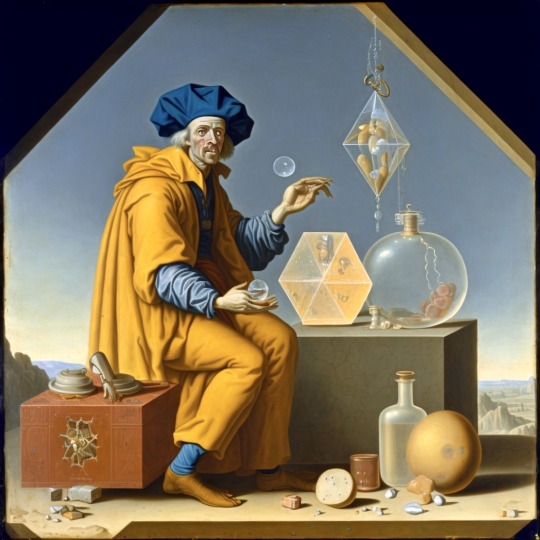
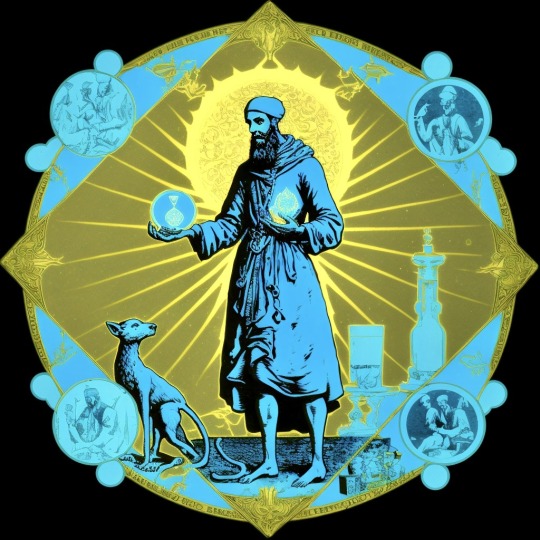
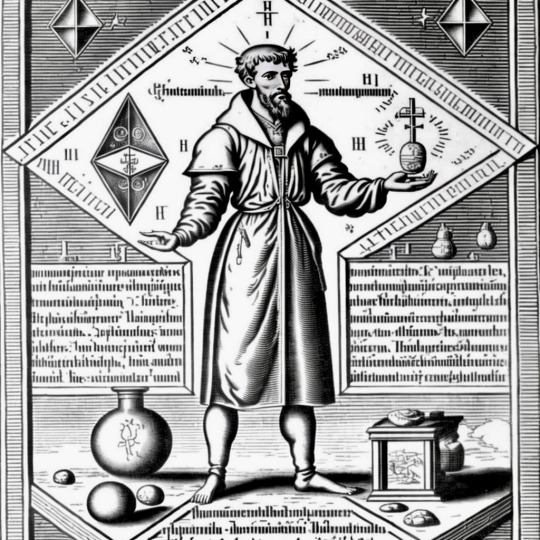


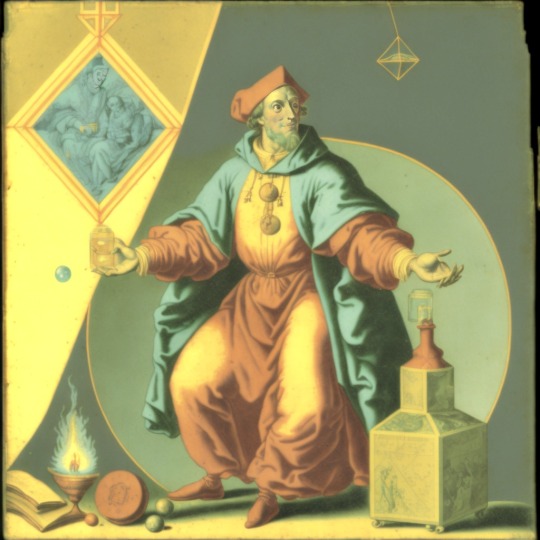
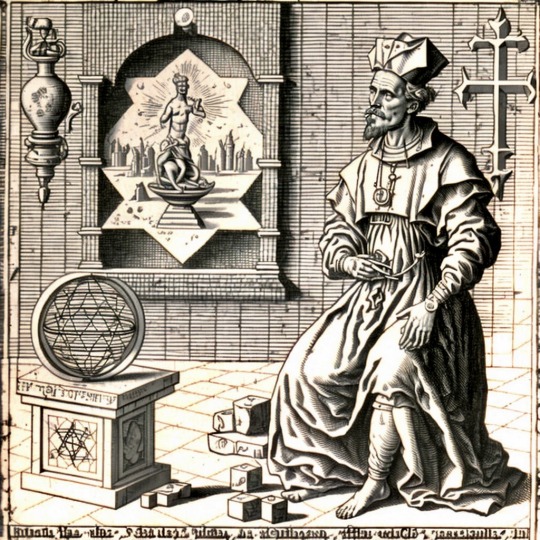

“The alchemist realizes that he himself is the Philosopher’s Stone, and that this stone is made diamond-like when the salt and the sulphur, or the spirit and the body, are united through mercury, the link of mind. Man is the incarnated principle of mind as the animal is of emotion. He stands with one foot on the heavens and the other on earth. His higher being is lifted to the celestial spheres, but the lower man ties him to matter. Now the philosopher, building his sacred stone, is doing so by harmonizing his spirit and his body. The result is the Philosopher’s Stone. The hard knocks of life chip it away and facet it until it reflects lights from a million different angles.” - Manly P. Hall
#art#digital art#alchemy#alchemist#philosophers stone#manlyphall#7 hermetic principles#hermes#hermetic#kybalion#ai#ai art#ai art gallery#ai art community#ai generated#artificial intelligence#mightyoakai#midjourney#midjourney ai#midjourney art
20 notes
·
View notes
Text


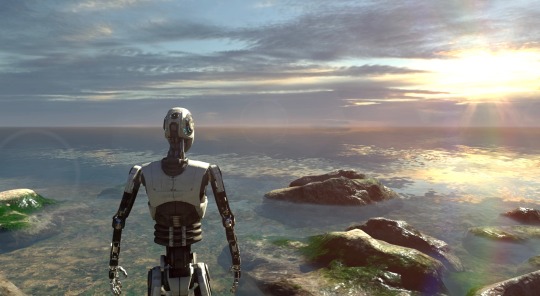

The Talos Principle replay 🤖🐈
#the talos principle#croteam#ps5#photomode#puzzle games#this is such an amazing game#I played this in 2015 and luckily forgot all the puzzle solutions#philosophical scifi#loving the replay
19 notes
·
View notes
Text
Delving into Poetic Wisdom: A Review of "On the Art of Poetry" by Aristotle
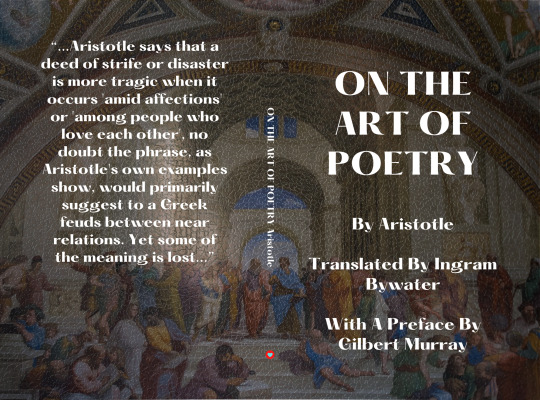
Aristotle's "On the Art of Poetry," translated by Ingram Bywater, stands as a seminal work in literary criticism, offering profound insights into the nature and function of poetry that continue to resonate with readers and scholars alike. Written in the 4th century BCE, this treatise serves as a comprehensive examination of the principles and techniques that underlie the creation of poetry, providing valuable guidance for poets and readers alike.
At its core, "On the Art of Poetry" is a testament to Aristotle's keen intellect and analytical prowess. In this work, Aristotle explores the various elements that contribute to the effectiveness of poetry, including plot, character, diction, and spectacle. Through his systematic analysis, Aristotle seeks to uncover the universal principles that govern the art of poetry, shedding light on its essential nature and its role in human society.
One of the most compelling aspects of "On the Art of Poetry" is Aristotle's emphasis on the importance of mimesis, or imitation, in poetry. According to Aristotle, poetry is a form of imitation that seeks to represent the actions, emotions, and experiences of human life. Through the skillful use of language and imagery, poets are able to create a vivid and lifelike portrayal of the world, inviting readers to engage with their work on a profound emotional and intellectual level.
Moreover, "On the Art of Poetry" offers valuable insights into the principles of dramatic structure and the role of catharsis in tragedy. Aristotle argues that tragedy is a form of poetry that evokes feelings of pity and fear in the audience, leading to a purgation or cleansing of these emotions. Through the depiction of the fall of a tragic hero, tragedy allows audiences to confront their own mortality and the fragility of human existence, ultimately leading to a deeper understanding of the human condition.
In addition to its exploration of tragedy, "On the Art of Poetry" also examines the principles of comedy and epic poetry, providing valuable guidance for poets working in these genres. Aristotle discusses the importance of unity of plot, character, and theme in epic poetry, as well as the role of humor and satire in comedy. Through his analysis, Aristotle highlights the diversity of poetic forms and the unique challenges and opportunities that each genre presents to the poet.
In conclusion, "On the Art of Poetry" by Aristotle is a timeless classic that continues to inspire and enlighten readers with its profound insights into the nature of poetry. Aristotle's systematic approach to literary criticism, coupled with his keen observations and analytical rigor, make this work an indispensable resource for anyone interested in the art of poetry. With its timeless wisdom and enduring relevance, "On the Art of Poetry" remains a cornerstone of literary theory and a testament to the enduring power of poetic expression.
Aristotle's "On the Art of Poetry," is available in Amazon in paperback 12.99$ and hardcover 18.99$ editions.
Number of pages: 116
Language: English
Rating: 10/10
Link of the book!
Review By: King's Cat
#Aristotle#Poetry#Literary criticism#Mimesis#Imitation#Dramatic structure#Tragedy#Catharsis#Comedy#Epic poetry#Unity of plot#Characterization#Diction#Spectacle#Poetics#Aesthetic principles#Greek literature#Philosophical discourse#Aristotle's theory#Literary analysis#Poetic form#Emotion#Human experience#Morality#Ethics#Aesthetics#Universal principles#Literary genres#Rhetoric#Imagination
2 notes
·
View notes
Text
we are bees for machines
#such a wild bomb of a realization#talos principle#best philosophical puzzle game OTY#if you see me cross-posting this one#no you dont
5 notes
·
View notes
Text
tattoo day !
#but first... philosophy of law#now really its pol obligation and the principle of fairness#but written by a legal philosopher </3#hla hart boo we hate you
5 notes
·
View notes
Text
aristotle really does spend like 100 pages talking abt semen in Generation of Animals tho
#tep.txt#i genuinely think that generation is one of his more important works for u if u want to be an aristotelian philosopher#who has anything to say to the modern world#bc aristotle is wrong abt so much but you can use that to see how to apply his principles#to modern science#bc he was doing the same w the science of his day#ten times more important than metaphysics and almost on par w the ethics and politics#philosophy posting
3 notes
·
View notes